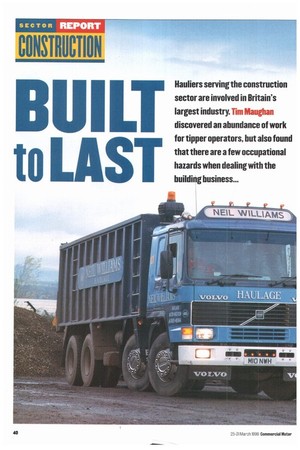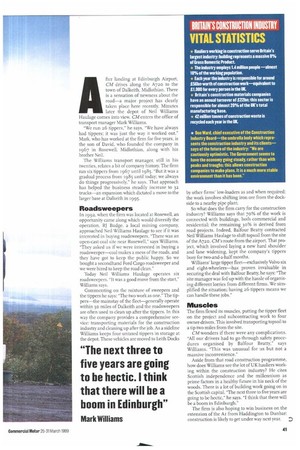to LAST
Page 42

Page 43

If you've noticed an error in this article please click here to report it so we can fix it.
Hauliers serving the construction sector are involved in Britain's largest industry. Tim Maughan discovered an abundance of work for tipper operators, but also found that there are a few occupational hazards when dealing with the building business...
After landing at Edinburgh Airport, CM drives along the A72o to the town of Dalkeith, Midlothian. There is a sensation of newness about the road—a major project has clearly taken place here recently. Minutes Eater the depot of Neil Williams Haulage comes into view. CM enters the office of transport manager Mark Williams.
"We run 26 tippers," he says. "We have always had tippers; it was just the way it worked out." Mark, who has worked at the firm for five years, is the son of David, who founded the company in 1967 in Rosewell, Midlothian, along with his brother Neil.
The Williams transport manager, still in his twenties, relates a bit of company history. The firm ran six tippers from 1967 until t9 85. "But it was a gradual process from 1985 until today; we always do things progressively," he says. That approach has helped the business steadily increase to 32 trucks—an expansion which dictated a move to the larger base at Dalkeith in 1995.
Roadsweepers
In 1992, when the firm was located at Rosewell, an opportunity came along which would diversify the operation. RJ Budge. a local mining company, approached Neil Williams Haulage to see if it was interested in buying roadsweepers. "There was an open-cast coal site near Rosewell." says Williams. "They asked us if we were interested in buying a roadsweeper—coal makes a mess of the roads, and they have got to keep the public happy. So we bought a secondhand Ford Cargo roadsweeper and we were hired to keep the road dean."
Today Neil Williams Haulage operates six roadsweepers. "It was a good move from the start," Williams says.
Commenting on the mixture of sweepers and the tippers he says: "The two work as one." The tippers—the mainstay of the fleet—generally operate within 30 miles of Dalkeith and the roadsweepers are often used to clean up after the tippers. In this way the company provides a comprehensive service: transporting materials for the construction industry and cleaning up after the job. As a sideline Williams keeps four untaxed tippers in storage at the depot. These vehicles are moved to Leith Docks by other firms' low-loaders as and when required; the work involves shifting iron ore from the dockside to a nearby pipe plant.
So what does the firm carry for the construction industry? Williams says that 70% of the work is connected with buildings, both commercial and residential; the remaining 30% is derived from road projects. Indeed, Balfour Beatty contracted Neil Williams Haulage to shift topsoil from the site of the A72o, CM'S route from the airport. That project, which involved laying a new hard shoulder and lane widening, kept the company's tippers busy for two-and-a-half months.
Williams' large tipper fleet—exclusively Volvo six and eight-wheelers—has proven invaluable in securing the deal with Balfour Beatty, he says: "The site manager was fed up with the hassle of organising different lorries from different firms. We simplified the situation; having 26 tippers means we can handle these jobs."
Muscles
The firm flexed its muscles, putting the tipper fleet on the project and subcontracting work to four owner-drivers. This involved transporting topsoil to a tip two miles from the site.
CM wonders if there were any complications. "All our drivers had to go through safety procedures organised by Balfour Beatty," says Williams. "This was unusual for us but not a massive inconvenience."
Aside from that road construction programme, how does Williams see the lot of UK hauliers working within the construction industry? He cites Scottish independence and the millennium as prime factors in a healthy future in his neck of the woods. There is a lot of building work going on in the Scottish capital. "The next three to five years are going to be hectic," he says. "I think that there will be a boom in Edinburgh."
The firm is also hoping to win business on the extension of the Ai from Haddington to Dunbar: construction is likely to get under way next year. 0
















































































































